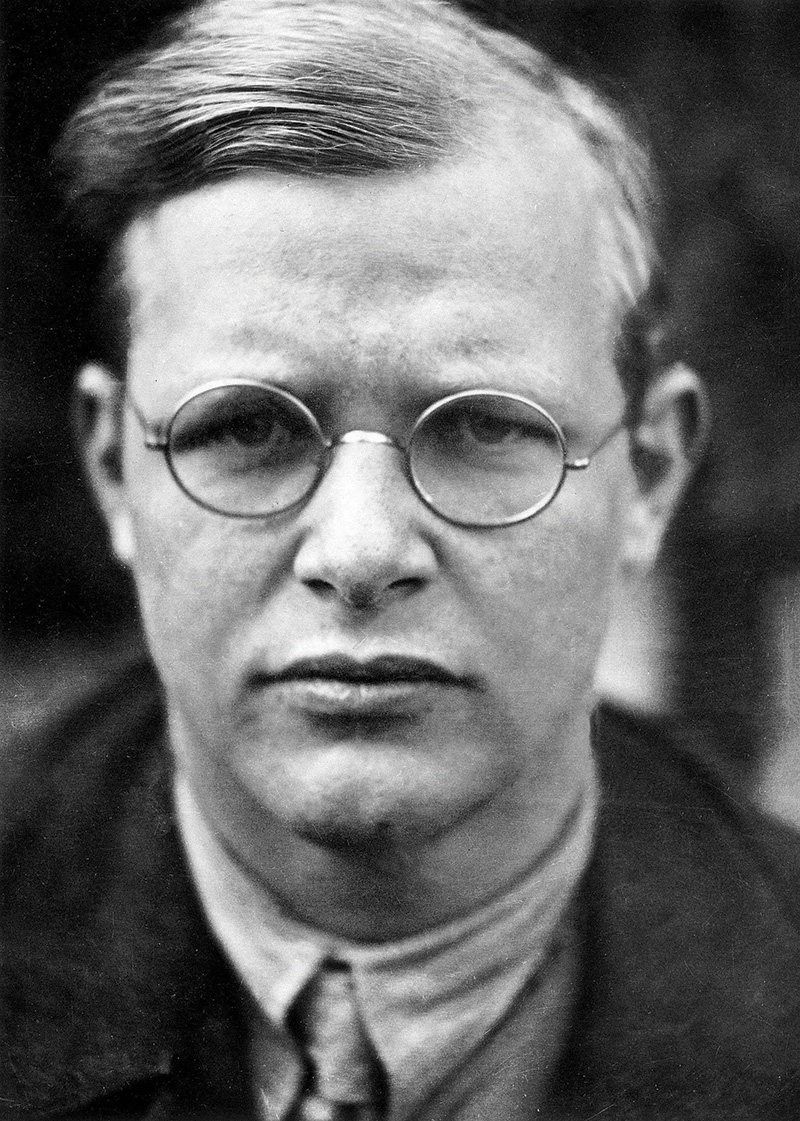Lessons from Bonhoeffer
Dudley Rose March/April 2023Learning to put God and others—rather than self—at the heart of religious freedom
 In January 2017, four days after the inauguration of the then-president of the United States, the first class meeting of my spring-term course at Harvard Divinity School focused on the life and thought of Dietrich Bonhoeffer, the German theologian of the 1930s and early 1940s who was executed for his resistance to the regime of Adolf Hitler. It is a seminar class, usually with only six to eight students willing to do close reading of a full spectrum of Bonhoeffer’s texts, including his early academic theology. But in that semester, as a new president took office, the course drew several times that many students.
In January 2017, four days after the inauguration of the then-president of the United States, the first class meeting of my spring-term course at Harvard Divinity School focused on the life and thought of Dietrich Bonhoeffer, the German theologian of the 1930s and early 1940s who was executed for his resistance to the regime of Adolf Hitler. It is a seminar class, usually with only six to eight students willing to do close reading of a full spectrum of Bonhoeffer’s texts, including his early academic theology. But in that semester, as a new president took office, the course drew several times that many students.
Harvard Divinity School has a diverse student body and, not least, a religiously diverse student body. In the Bonhoeffer class that spring were mainline Christians, evangelical Christians, Roman Catholics, Orthodox Christians, Unitarian universalists, “nones” (who answer “none of the above” on religious identification surveys), Jews, Hindus, Muslims, and even a Buddhist monk from Asia. A stumbling block for several of these students was Bonhoeffer’s insistently explicit Christian language. In almost everything he wrote, Bonhoeffer expressed his ideas in Christological terms. For him, Jesus Christ is the center of our existence and of history.1
Many students asked, “Bonhoeffer’s Christianity sounds so exclusive of other faiths; can I learn anything useful from him?” Phrased more provocatively: “Can I trust him to say anything valuable to me, if his theology denigrates my religious perspective or makes me out to be a heathen other?”
Existing for Others
Many readers, depending on their own orientations, have labeled Bonhoeffer as either an evangelical or liberal Christian. For different reasons, both sides have claimed him. My point here is not to take a side in the argument about whether Bonhoeffer was one or the other, but rather to show that he fits very uneasily—that is to say, not at all well—in either camp.
The reasons are manifold, but a few stand out. Theologically, Bonhoeffer was deeply Lutheran. Human fallenness was fundamental to his theology. Like Luther, Bonhoeffer was insistently suspicious of the human self. In the winter semester of 1932-1933 he lectured on the first chapters of Genesis. In the lectures, later published as Creation and Fall, Bonhoeffer argued that the serpent sowed a seed of doubt about God in the minds of Adam and Eve and seduced them to believe that they were, or could be, like God. To borrow Luther’s phrase, Bonhoeffer saw this as the moment when the human heart inescapably became “curved in on itself.”
The significance of Bonhoeffer’s earliest academic dissertations, Sanctorum Communio and Act and Being, are often discounted or misunderstood. But in those early works Bonhoeffer outlined a basic theological, philosophical, and anthropological framework of social-ethical relationship that undergirds his work throughout his life.
Bonhoeffer argued that our fallen natures make us epistemic islands and that any knowledge of another gained from ourselves is circular at best. Indeed, he argued that we do not even properly become a self until we grasp the ethical claim that another self makes on us. Bonhoeffer’s notion, which he called sociality, said essentially that we do not become a self and do not exist except in a social-basic relationship. More than that, for Bonhoeffer we become a self only when another human places an ethical limit on us. Radically, then, Bonhoeffer’s very idea of being requires being—existing—for another. This idea he never left behind. When in 1932 he preached on John 8:32, “The truth will make you free,” Bonhoeffer averred that the truth will make you free not for yourself, but from yourself. In a letter to his friend Eberhard Bethge in 1944, Bonhoeffer defined this-worldliness, which for him becomes the highest form of faithful living, as “no longer [taking seriously] one’s own sufferings but rather the suffering of God in the world,” that is, taking seriously the suffering of others, whom he sees as God in the world.
Michelle Sanchez, a Luther and Reformation scholar, has written brilliantly on Bonhoeffer’s debt to Luther in this area.2 Sanchez found students in one of her courses struggling with the same problems with Bonhoeffer’s explicit Christian language as I did in mine. She asks readers of Bonhoeffer to engage the purposes for which Bonhoeffer, and Luther before him, employ this robustly Christian language. She observes, “One of Bonhoeffer’s contributions to theological scholarship is precisely in demonstrating a use of Christian language—of clear, bold statements—as capable of cultivating epistemic humility and contextual responsibility to the other.”3
Hazards of a ‘Public’ Faith
Late in his life Bonhoeffer developed the idea of the “arcane discipline,” which had been in the background of his writing for a long time. Sometimes called the “secret discipline,” it comprises, among other things, the practices of prayer, rituals, sacraments, and confession in addition to the doctrines of the church. According to Bonhoeffer, these practices should be hidden or at least not paraded—that is, they should not be the primary public face of Christians or the church, for a number of related reasons.
Fundamentally, Bonhoeffer believed that the practices belonging to the arcane discipline of Christianity are usually misunderstood. Indeed, by their very nature they are impossible to understand or reconcile with reason. Far from a shortfall, Bonhoeffer understood the inability to fully grasp the arcane discipline to be fundamental to the Christian faith. Only when the Christian must give up any claim to the reasonableness of prayer, confession of sins, or doctrines such as the Trinity or the virgin birth, can the Christian move toward epistemic humility and true faith. Bonhoeffer wrote to his friend Bethge in June of 1944, “My view is that the full content, including the ‘mythological’ concepts, must remain—the New Testament is not a mythological dressing up of a universal truth, but this mythology (resurrection and so forth) is the thing itself!”4 The leap of faith is logically dependent on the reality that the mysteries cannot be fully understood. Arcane discipline, then, deepens the sense of relationship with and dependence on Christ. Its practices are not a gateway to comprehension. One must throw oneself into the hands of God, as he said elsewhere, without even the presupposition of God.
With this in mind, Bonhoeffer saw the danger where he always sees it for the church. He feared that rather than preconditions for faith, the arcane discipline would too easily become distorted and valued for the content of its truth claims. And possession of the truth would too easily be grasped as power—the power to demand, to have privilege, or to control others, even to control God.
Expressed publicly, outside the church, the practices of the arcane discipline are in danger of failing on this same ground. They convey Christianity as a set of beliefs, practices, and truth claims for guiding society. Bonhoeffer was deeply worried about the church’s implication in Nazi Germany’s religious and political certainty. He was only too aware of how truth claims confidently uttered from pulpits and political podiums alike were giving sanction to unspeakable slaughter in his homeland.
In another letter to Bethge, written July 21, 1944, Bonhoeffer spoke of taking seriously “God’s suffering in the world.” This simple phrase is like a key to Bonhoeffer’s thinking. It courses through his early dissertations Sanctorum Communio and Act and Being, through his sermons and academic lecture courses, and through The Cost of Discipleship, Life Together, Ethics, and his prison letters. In the book he was writing about the future, published among the Letters and Papers From Prison, he said, “Our relationship to God is a new life in being there for others.”5
God at the Center
I have been describing a bit of Dietrich Bonhoeffer’s notions of the church and the Christian life. It is probably obvious that religious freedom is not a principal theme of his, at least not explicitly. Indeed, when he speaks of freedom, he is fond of advocating freedom from ourselves rather than freedom for ourselves. But it is just here that perhaps Bonhoeffer can give some guidance on the topic of religious freedom. Bonhoeffer is a highly confessional Christian who uses robust Christian language to describe his faith, so much so that my non-Christian students, and many of my Christian students, found his language off-putting and exclusionary. Yet a closer look reveals that Bonhoeffer’s commitment to alterity—that is, to relationship with and responsibility to others—is fundamental to his Christianity, to his understanding of human beings, and to his understanding of God. He believes connection with others is so fundamental that without it, Christianity collapses in on itself.
In the current context in the United States, religious freedom has come to mean—for some, at least in part—the freedom to exclude others. And yet it is fair to say that many who hold exclusionary religious views mean to protect Christianity, which they view as under siege in an increasingly profane culture. Bonhoeffer, perhaps, offers important cautions as well as a way forward for such contemporary Christians.
The cautions are stark. To believe that one understands and possesses all of God’s truth is simply to take the serpent’s bait, to put oneself—rather than God or Christ—in the center and to thereby remain alienated from God. To put oneself in the center inevitably leads to placing others outside, others whom Bonhoeffer sees as God in the world. Thus, the alienation from God becomes doubled.
The way forward Bonhoeffer offers, however, is far from an abandonment of a robust Christian faith. For him the Scriptures, sermons, and doctrines of the church call the Christian into relationship with God; they cut off self-centeredness and make a capacious space in the center for God and for others who are God in the world.
1 Dietrich Bonhoeffer, “Lectures on Christology (Summer 1933),” Berlin: 1932-1933, Dietrich Bonhoeffer Works, ed. Carsten Nicolaisen, Ernst-Albert Scharffenorth, and Larry L. Rasmussen, trans. Isabel Best, David Higgins, and Douglas W. Stott (Minneapolis: Fortress, 2009), vol. 12, p. 325.
2 Michelle C. Sanchez, “Reading Tradition as Pedagogy in Calvin and Augustine,” Scottish Journal of Theology 72, no. 1 (2019): 20–45.
3 Ibid.
4 Dietrich Bonhoeffer, Letters and Papers From Prison (1951), p. 430.
5 Ibid., p. 501.
Article Author: Dudley Rose
Dudley C. Rose is associate dean for ministry studies emeritus at Harvard Divinity School. Rev. Rose also served more than 30 years as senior pastor at North Prospect Union United Church of Christ, a congregation in Medford, Massachusetts.
